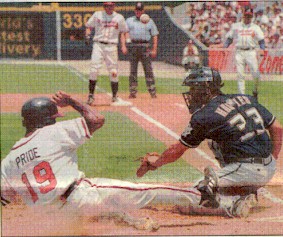| Brave player: Despite disabilities, Pride pushed himself into the major leagues |
Pride overcomes obstacles
| Brave player: Despite disabilities, Pride pushed himself into the major leagues |
By Ray Glier
GANNETT NEWS SERVICE
| ATLANTA - Curtis Pride thought the taunts were in the rearview mirror of his childhood. He endured playground nastiness because he was born deaf and has a serious speech impediment. He was self-conscious as a child, wondering if people thought he was mentally retarded because he couldn't talk as well as other children. Now the ridicule was back. But this time it was grown men, baseball players, making fun of him. He couldn't understand why his teammates ("three or four") would do that to him. |  |
It was July 1992, while he was with the Binghamton (NY) Mets, a Class AA ball club. He almost quit professional baseball and wished he had stuck with soccer where he was almost certainly headed for stardom after a career as a high school superstar in the sport. "Worst year of my life," the 29-year old Pride said. "I was real low." That was the month he lost his starting job in left field, lost his hitting stroke and lost his girlfriend.
But a guy who can overcome a disability is hard to scare away. He got a pep talk from his parents and didn't quit on the Mets. He just moved on to another team, revived his career, and didn't quit on the Mets. He just moved on to another team, revived his career, and climbed to the big leagues as a reserve outfielder with the Atlanta Braves this season.
He was hitting .243 for the Braves before he went on the disabled list June 27. After three weak at-bats in a game against Toronto, he finally hit something solid with a bat - a concrete wall, in disgust. The bat splintered and sliced his hand open. Pride returned Monday and scored the game-winning run in the Braves' 3-2 victory over Cincinnati.
While not condoning that specific incident, it's indicative of the emotional energy and devotion that kept him in the game seven years ago in Binghamton.
He was in his sixth minor league season in the Mets organization, and it looked like he had finally hit a dead end.
It was hard for Pride to take because he was a fabulous athlete out of high school in Silver Spring, Md. - a prep All-American in soccer, a Division I basketball recruit to William & Mary where he made the All-Defensive team two years in the Colonial Athletic Conference.
The Mets had grabbed him in the 10th round of the draft, figuring they could transform a great athlete into a very good baseball player. But he had averaged .262 the previous three seasons, and was in a serious slump in 1992 when his average plummeted to .200 in Binghamton. That's when he nearly quit.
Pride, who wears a hearing aid and communicates by reading lips, ran into trouble with some teammates in Binghamton who he said would taunt him or mock him to his face.
"I understood that stuff when it was kids doing it," he said. "But not older guys on my team."
Pride exercised his option following the 1992 season and became a six-year free agent.
He hooked on in Montreal's farm system in 1993 and climbed to the big leagues late in the season. But in 1994 he slid down to the minors. He split the 1995 season between the Class AAA team in Ottawa and Montreal.
In 1996, Pride was a free agent again and he pulled himself back up to the majors. After finishing the season with two games in Boston, Pride was a free agent again, at the start of spring training in 1998. The mighty Braves gave him a shot, and he jumped over several prospects in the organization to grab a roster spot.
"I've been in this game 39 years and it would be hard for me to tell you of a player who has worked harder," third base coach Bobby Dews said.
"The guy has got great courage. He has overcome a disability, learned to communicate and done very well. He's an inspiration."
Pride took a job because he was a left-handed pinch-hitter off the bench and could play all three outfield positions. He has a decent arm, and he is a very fast runner.
In a game against the New York Yankees in late June, Pride was hit on the left thigh by a David Cone fastball and limped to first base. The next batter lined a double into the left-center gap, and he raced home from first, despite the injury.
"He knew he had to score from first with the pitcher up next," Dews said. "Even though he was hurt, he knew the situation and he knew he had to score."
John Pride, Curtis' father, said the deafness had a lot to do with Curtis' academic success, not just athletic success.
"It probably made him work even harder, especially in academics," John Pride said. "He didn't want people to think he was mentally retarded because he had a speech impediment. So he pushed himself. We never had to push him.
"I'm biased; but he accomplished a remarkable thing. He played four years of Division I college basketball during the school season, played four years of summer professional baseball with the Mets, and he got a degree in 4 1/2 years from what I think is a very good school. I think that says a lot."
~
Originally Published: Montgomery Advertiser, 28 July 1998
Back to Cox Family News